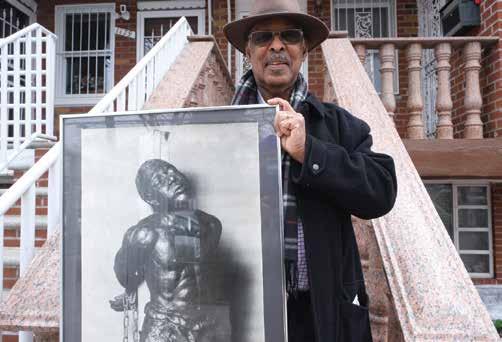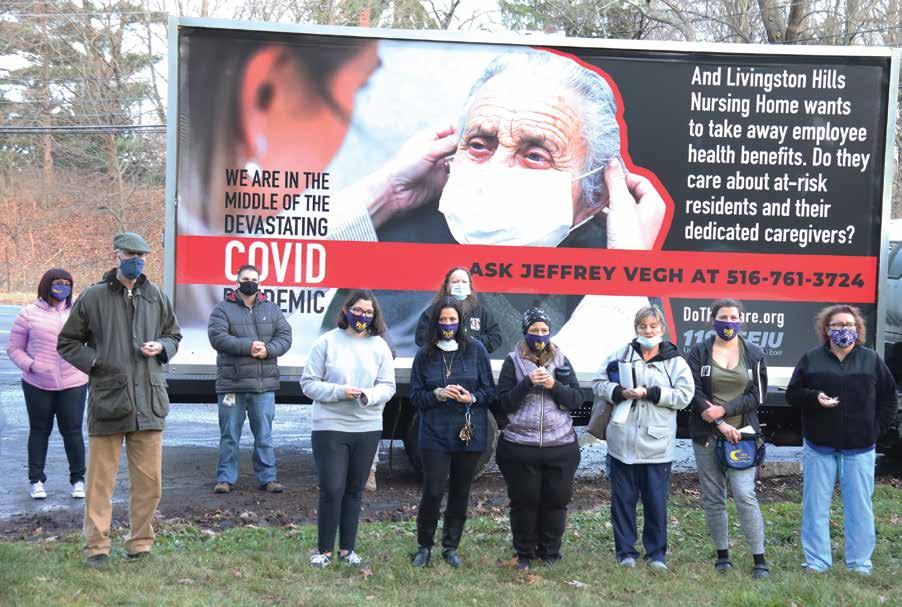
7 minute read
Frontline
from 1199 Magazine
by 1199SEIU
Frontline Vaccinations Commence
Healthcare workers are rolling up their sleeves to defeat COVID-19.
Advertisement
Millions of Bandaided biceps signal
a return to normalcy: the COVID-19 vaccine rollout is under way.
As this magazine goes to press, healthcare workers across the United States are getting vaccinated, and among them are hundreds of thousands of 1199SEIU members. From South Florida to Northern New York State, COVID-19 vaccines are being administered to workers in homecare agencies, hospitals, nursing homes, and retail drug outlets.
“I was not at all nervous about getting vaccinated,” says Carlos Villalba, a clerk at a midtown Manhattan Rite Aid drugstore. “I was nervous about NOT getting vaccinated.”
Villalba is the only member of his family currently working outside the home, and has been afraid of transmitting the virus to his parents and siblings.
Carlos Rosa, a patient transporter at University of Rochester’s Strong Medical Center had similar fears. Rosa was the first healthcare worker vaccinated in Central New York’s Monroe County. Rosa was anxious to take the vaccine and thrilled when his chance to get the shot arrived.
“I was surprised to be first,” says
Rosa, who received his first dose of the Pfizer vaccine on Dec. 15. “I did it to show my co-workers that there was nothing wrong with the vaccine and this is how we are going to move forward as a country. Also, my father has bad asthma, and my mother is getting older. I had been staying away from them, and I missed them.”
– Patricia O’Hara, Partners In Care Home Health Aide
Home Health Aide Patricia O’Hara is being treated for ovarian cancer, and jumped at the opportunity to get vaccinated.


1199SEIU has undertaken a massive campaign to educate members about the Pfizer and Moderna vaccines, and how they work. (For more information, see “The More You Know” on page 11.) The Union is also working with allies and institutions to help members get vaccinated and ensure adequate supplies of the vaccine for front-line healthcare workers.
Lolleita Nelson, an RN at St. John’s Episcopal Hospital in Far Rockaway, NY, took her first vaccine shot on Dec. 15 and says it was never a question of “if” but “when” she would get vaccinated.
“I have seen what happened to people who had COVID-19, and I remember how I cried seeing people on ventilators and sometimes pass away,” she says.
Nelson also thinks 1199’s education campaign is vital to combat the misinformation swirling around vaccines.
“I tell everyone to treat that as [anti-vaccine] propaganda and not to listen,” she says. “These vaccines will save your life and protect your family and friends. My advice is to educate yourself. Instead of listening to rumors, listen to scientists, doctors, and the experts at Centers for Disease Control.”
In this vein, 1199’s education efforts
include tele-town halls and conference calls with experts, institutional outreach, a weekly email newsletter, Frontline News, literature to help answer questions, and a host of other resources available at www.1199seiu. org/covid19vaccineresources.
Dr. Van Dunn, Chief Medical Officer of the 1199SEIU National Benefit Fund, has been an unflagging source of reassurance and up-to-date information since the pandemic’s outbreak and through the vaccine rollout.
“At first, I thought the vaccine was developed too fast, and then I listened to Dr. Dunn and spoke to a couple of doctors. I also read up on materials from the Union,” says Angela Thomas, a unit clerk at Schaffer Extended Care at Montefiore New Rochelle in New York’s Westchester County. “Now I am supportive, and from the time I got vaccinated, I was telling other members they should too.”
A central goal of the Union’s
education and outreach is addressing historic disparities and longstanding systemic racism in health care that contributes to fear and suspicion of the vaccine in communities of color. Derick Rias, a Physician Assistant at Richmond University Medical Center on Staten Island, acknowledges that history, but he also trusts science. As evidence, Rias points to progress around HIV/AIDS, polio, smallpox, and other diseases. He has been talking with his neighbors about vaccination and vaccine safety.
“In a lot of African American neighborhoods, people are afraid to get vaccinated, and it is understandable because of what has happened [to us] over the years,” he says. “But I try to explain to people that this is our chance get our freedom back. No one wants to be sheep, but they don’t call it ‘herd’ immunity, for nothing.”
Partners In Care Home Health Aide Patricia O’Hara was vaccinated at a recent event at the agency’s Manhattan headquarters. An immune compromised breast cancer survivor who is currently under treatment for ovarian cancer, O’Hara jumped at the chance.
“I am doing anything I can to encourage people to go out and get vaccinated,” she says. “Unless 80% of us get vaccinated we are never going to get past this.”
– Derick Rias, Physician Assistant, Richmond University Medical Center, Staten Island, NY
Physician Assistant Derick Rias trusts science and uses it to help allay vaccine fears in his community. Members at January vaccination event at Montefiore Medical Center in the Bronx.
The More YouKnow: Here Are Some COVID-19 Vaccine Facts
Healthcare workers are among the first in the nation to be eligible to take the new COVID19 vaccine—which evidence shows will provide significant protection against the deadly disease. There are two vaccines currently available from Pfizer and from Moderna, and both use messenger RNA (mRNA) technology. Unlike other vaccines, mRNA technology does not use any live virus particles. You will not be exposed to the virus that causes COVID-19.
SAFETY AND EFFECTIVENESS
Is the vaccine safe and effective? Both vaccines have a very high level of effectiveness: Pfizer has a 95 percent rate, and Moderna has a 94 percent rate. To be effective, both vaccines require two shots, given a few weeks apart. Vaccines cannot be mixed and matched between doses. The length of vaccine-induced immunity is not known at this time and booster shots may be required. Some people who get a COVID-19 vaccine will experience side effects, particularly after a second dose. The side effects of the vaccine appear to be minor and temporary, including injection site pain, fatigue, and occasional fever, headache, or aching muscles and joints. These side effects fade within 1-2 days; no long-term effects have been detected thus far. While the vaccine provides significant protection, it is not 100% effective. There is a slight chance that vaccinated individuals can still get infected with a mild case of the virus. Those who have taken the vaccine can also still spread the virus to others at home and at work and thus it is critical that everyone continue to wear PPE and follow public health protocols for the foreseeable future. Evidence shows the new COVID-19 vaccine will provide significant protection against the deadly disease.
DEVELOPMENT AND APPROVAL
What’s in the vaccine? The two vaccines both use messenger RNA (mRNA) technology. They do not use any live virus particles, meaning individuals will not be exposed to the virus that causes COVID-19. Instead, the messenger RNA—a piece of genetic code—directs cells to make the COVID-19 spike protein themselves, after which point the immune system creates the antibodies that fight COVID-19, providing a significant level of immunity. How was it developed? Because mRNA is easy to make in the laboratory, manufacturers saved years in development, accelerating the creation of the vaccine. In clinical trials for both vaccines, more than 73,000 people from the U.S. and around the world received injections, including more than 25,000 people from the communities most impacted by COVID-19, including Black, Latinx, and older people. How does a vaccine get approved? Vaccines must be approved by the Food and Drug Administration (FDA) before distribution. The FDA bases its decision to approve or not approve a vaccine on data from clinical trials. Independent experts and career scientists determine the vaccine’s safety based on the extent of side effects. If the clinical trial data shows enough evidence of efficacy and safety, the FDA will approve the vaccine.
VACCINE DISTRIBUTION
When will I be able to take it? Healthcare workers will be eligible to take the first dose of the vaccine as soon as late-December. Vaccines are free for healthcare workers, and administration costs will be covered by the 1199SEIU Benefit Funds. Employers will notify staff when they are eligible to be vaccinated. Vaccination is not mandatory but highly encouraged for healthcare workers and patients. The immunization status of a healthcare worker will not affect his/her work assignment.








